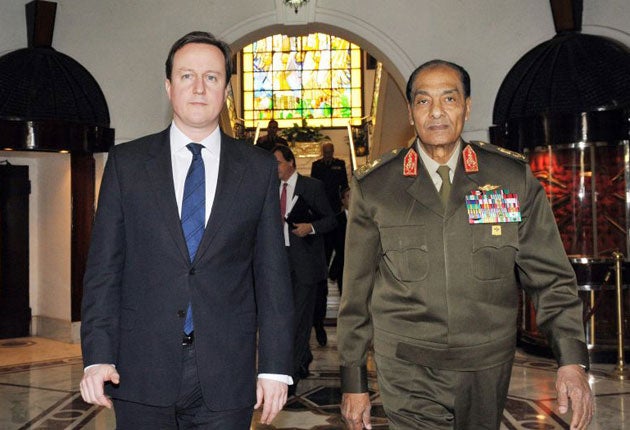
Your support helps us to tell the story
From reproductive rights to climate change to Big Tech, The Independent is on the ground when the story is developing. Whether it's investigating the financials of Elon Musk's pro-Trump PAC or producing our latest documentary, 'The A Word', which shines a light on the American women fighting for reproductive rights, we know how important it is to parse out the facts from the messaging.
At such a critical moment in US history, we need reporters on the ground. Your donation allows us to keep sending journalists to speak to both sides of the story.
The Independent is trusted by Americans across the entire political spectrum. And unlike many other quality news outlets, we choose not to lock Americans out of our reporting and analysis with paywalls. We believe quality journalism should be available to everyone, paid for by those who can afford it.
Your support makes all the difference.David Cameron today became the first major world leader to visit Egypt following the overthrow of the country’s President Hosni Mubarak ten days ago.
Mr Cameron arrived in Cairo just after 11am this morning for a short visit which will form part of a wider tour of the Middle East.
Speaking to reporters on route to Cairo Mr Cameron said he wanted to see “genuine change” in both Egypt and the wider region and that “reform and not repression” was the key to a stable future.
Responding to events in Libya Mr Cameron described the security crackdown as a “vicious for of repression” which he said was “appalling and unacceptable”.
During the trip he will meet Egyptian Prime Minister Ahmed Shafiq who was appointed by President Mubarak shortly before his departure.
He is also expected to meet representatives of the opposition in the country – although they will not include the Muslim Brotherhood - the banned Islamic group which has significant public support in the country.
Mr Cameron’s words will be carefully scrutinised across the region for hints at to how the West intends to respond to the unprecedented change across North Africa and the Middle East.
Some senior foreign policy experts have called for a new “Marshall Plan” for the region to provide economic incentives which could strengthen new democratic institutions.
However Mr Cameron is nervous about committing large amounts of British aid at a time of spending constraints at home. One official called the idea “ludicrous”.
Speaking on the flight to Cairo, Mr Cameron said: “This is a great opportunity for us to go and talk to those currently running Egypt to make sure this really is a genuine transition from military rule to civilian rule and see what friendly countries like Britain and others in Europe can do to help.
"I am particularly keen about being able to get to Egypt and to be one of the first people there."
Part of his agenda, during talks with the head of the armed forces supreme council, defence minister Mohamed Tantawi, will be a call for the lifting of emergency laws which have been in place for more than three decades.
"What is so refreshing about what's been happening is that this is not an Islamist revolt, this is not extremists on the streets; this is people who want to have the sort of basic freedoms that we take for granted in the UK," Mr Cameron said.
In an attack on the treatment of protesters in Libya, he said: "Our message, as it has been throughout this - I think we have been extremely consistent in saying that the response to the aspirations people are showing on the streets of these countries must be one of reform not repression.
"We can see what is happening in Libya which completely appalling and unacceptable as the regime is using the most vicious forms of repression against people who want to see that country - which is one of the most closed and one of the most autocratic - make progress.
"The response they have shown has been quite appalling.”
Join our commenting forum
Join thought-provoking conversations, follow other Independent readers and see their replies
Comments